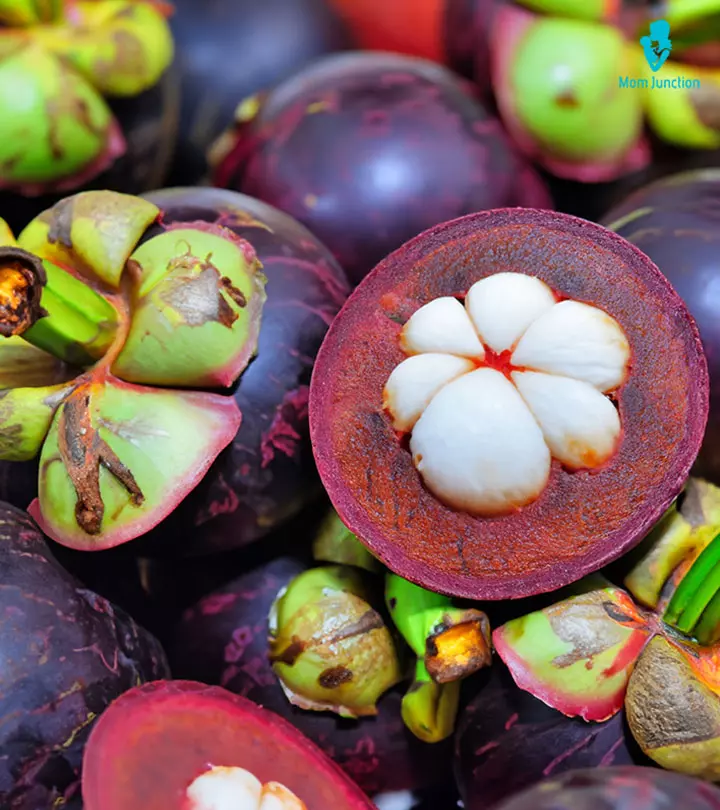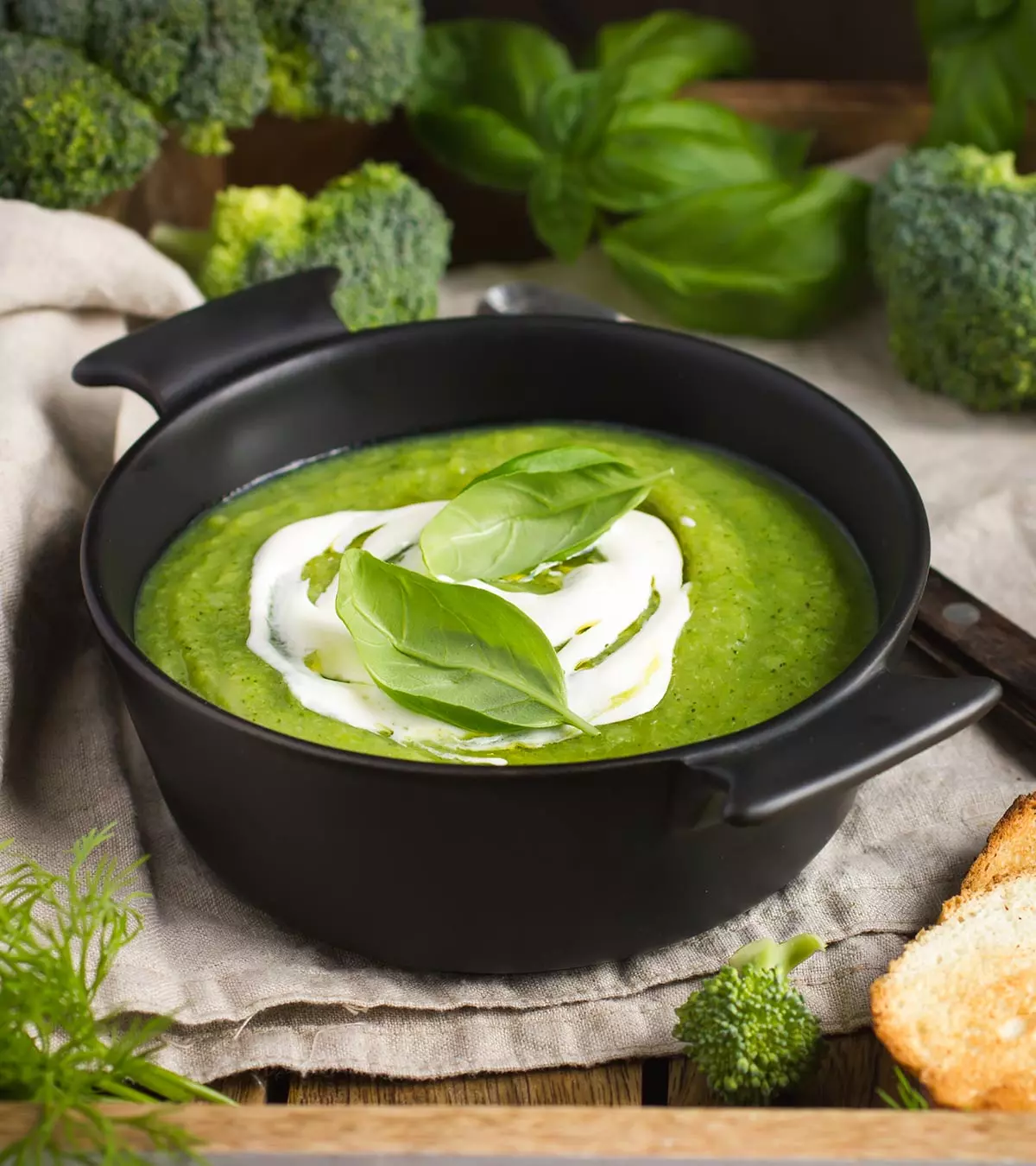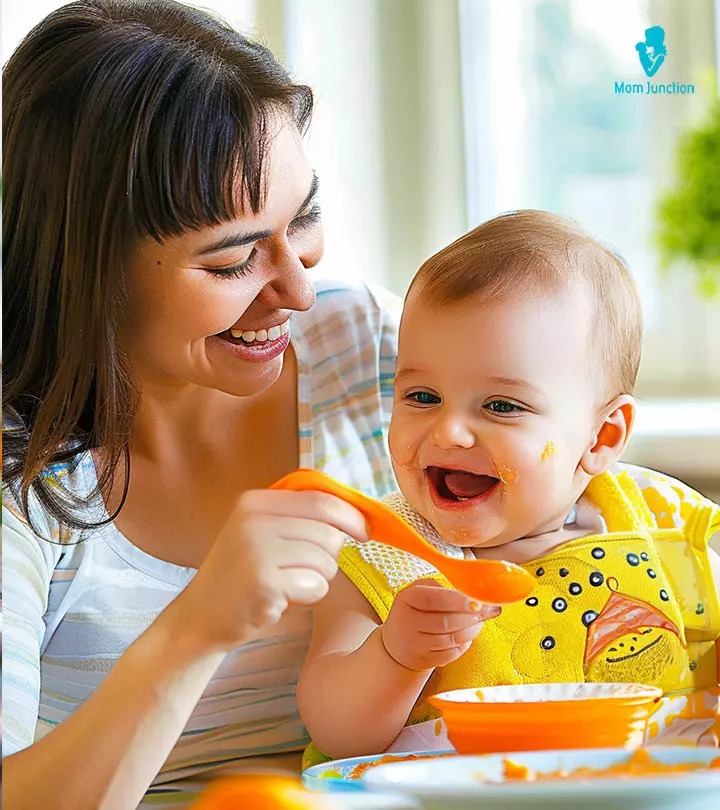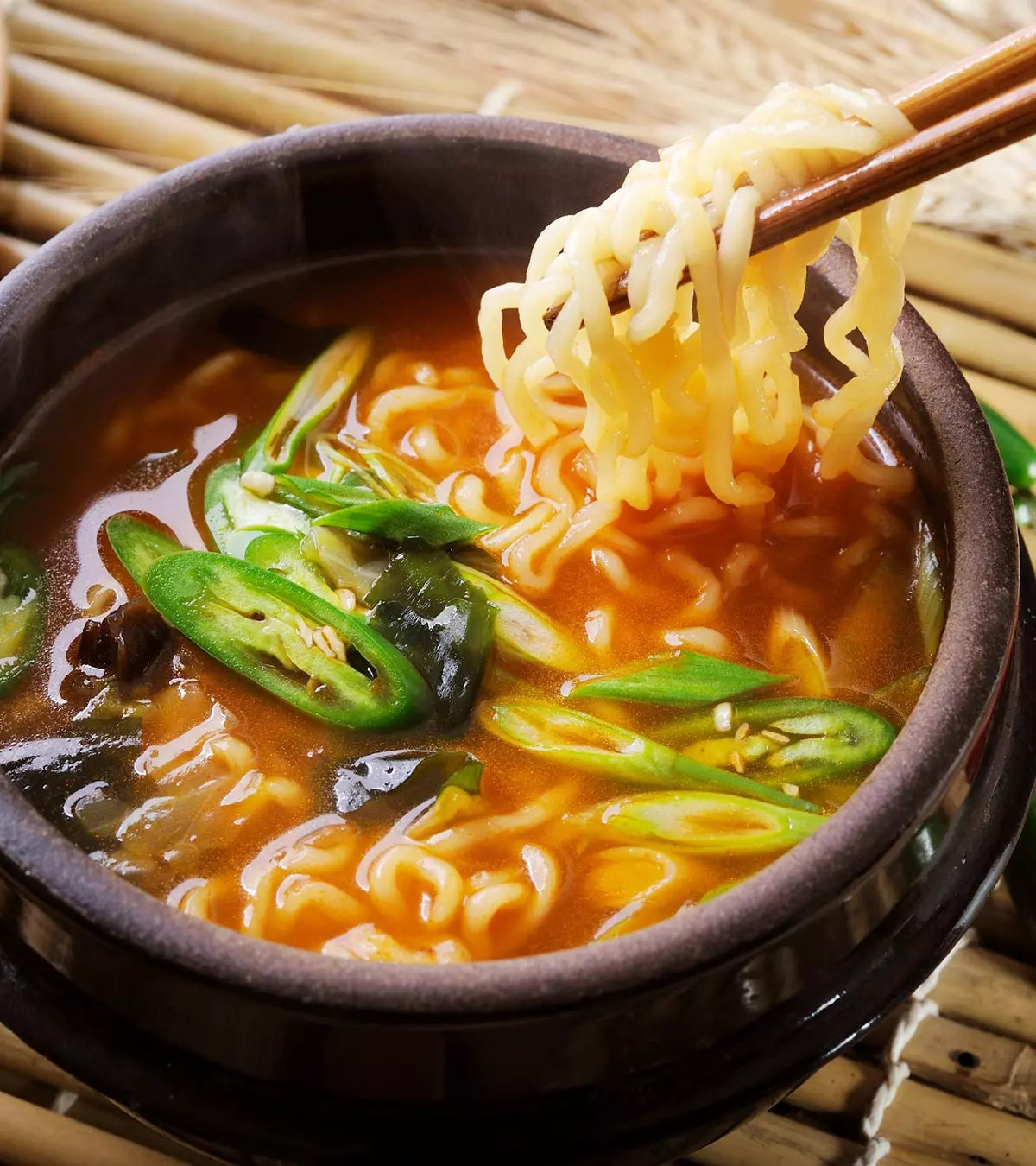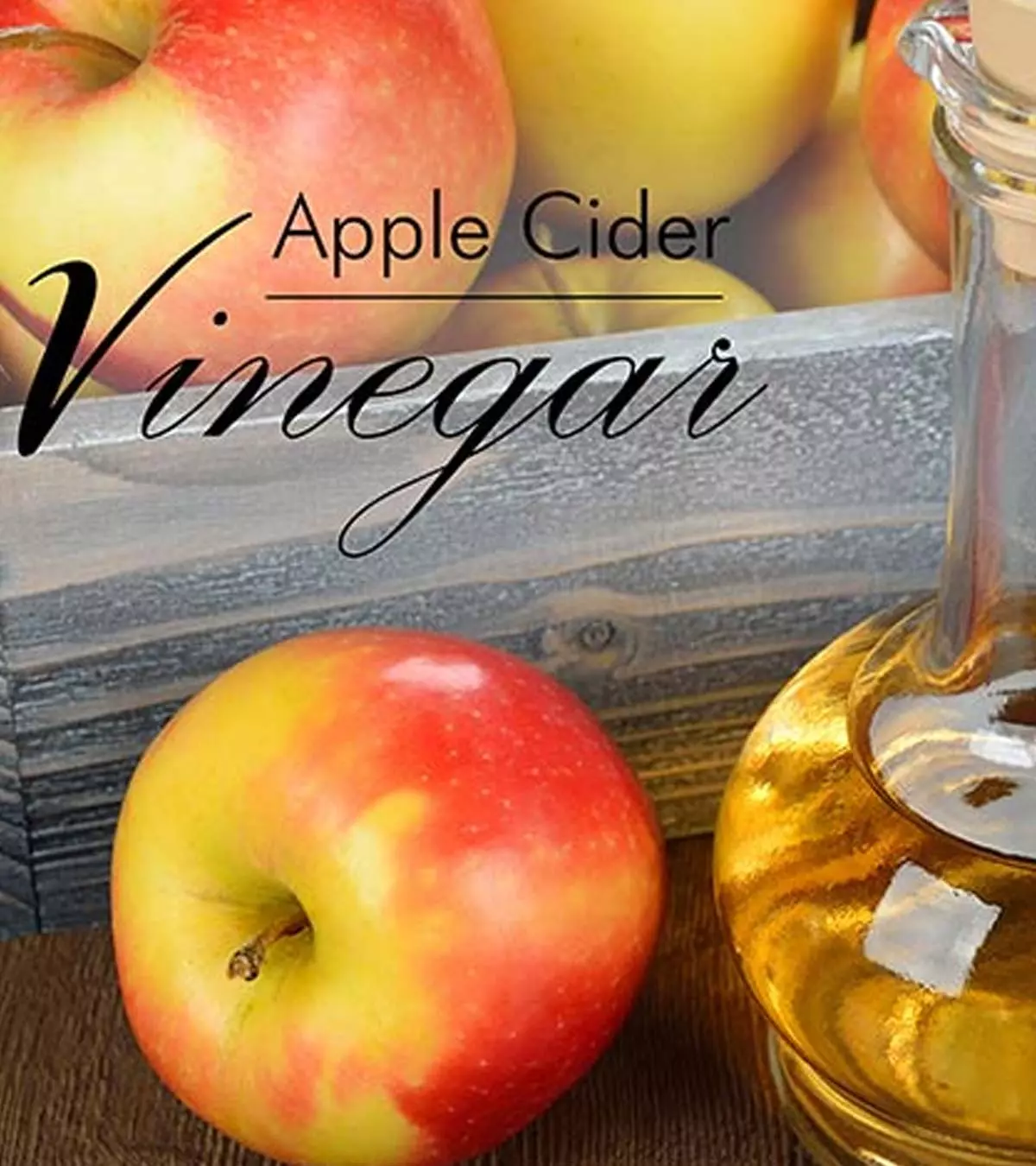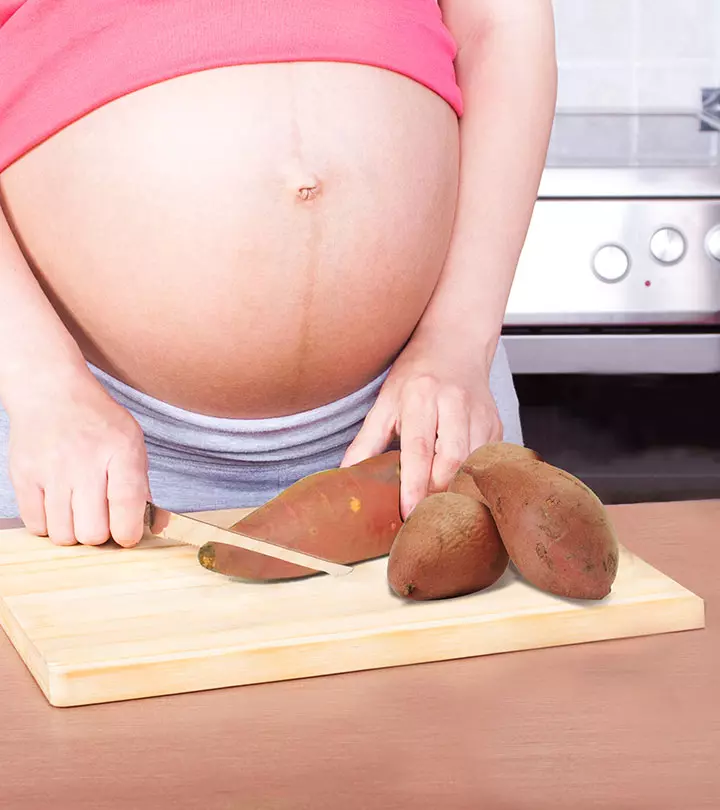
Image: ShutterStock
The benefits of yam during pregnancy are numerous for you and your baby. It is a rich source of vitamins, folic acid, and potassium and can help prevent various pregnancy-related health problems and aid in healthy fetal development.

Yam is a starchy vegetable that is similar to sweet potatoes in appearance but less sweet. They are rich in nutrients that can help alleviate morning sickness and pregnancy-related digestive problems. They also help babies achieve a healthy birth weight.
If you are considering including this root vegetable in your pregnancy diet, you can safely do so after consulting your healthcare provider. This is because yam may cause complications if you suffer from certain underlying conditions.
Continue reading to know more about the consumption of yam during pregnancy, including its beneficial properties and side effects.
Key Pointers
- Yam is rich in vitamins and minerals that can aid in curing morning sickness, preventing low birth weight, and regulating blood pressure during pregnancy.
- The antioxidants present in yam can improve digestion, prevent anemia, and strengthen bones. It also helps in reducing the risk of premature birth and miscarriage.
- Due to being a good source of carbohydrates, yam can help in boosting energy levels.
- Yam may also cause digestive issues and kidney stones, so it is important to consult a healthcare provider before consuming yam and limit its intake.
Nutritional Value Of Yam
Yam is a nutritious tubular vegetable containing several vital nutrients and bioactive compounds that can promote overall health. 100g of raw yam can provide the following nutrients that can help you meet your nutritional needs during pregnancy (1).
| NUTRIENTS | AMOUNT |
|---|---|
| Energy | 118Kcal |
| Carbohydrate, by difference | 27.9g |
| Fiber, total dietary | 4.1g |
| Calcium, Ca | 17mg |
| Magnesium, Mg | 21mg |
| Phosphorus, P | 55mg |
| Potassium, K | 816mg |
| Folate, food | 23µg |
| Choline, total | 16.5mg |
| Carotene, beta | 83µg |
Source: US Food And Drug Administration
Benefits Of Eating Yam During Pregnancy
If you like eating yam, there is no reason to stop now. Here are some reasons why including nutritious foods like yam in the pregnancy diet can be beneficial for maternal health:
1. Treats morning sickness

Morning sickness is one of the most common symptoms women experience during pregnancy. Adequate amount of vitamin B6 can provide relief from nausea and vomiting (2). Yams contain a good amount of vitamin B6 and may calm morning sickness (1).
2. Prevents low birth weight
Yam contains vitamin B6, which helps prevent low birth weight in babies. In the United States, around 8.52% of babies were born with low birth weight in 2025, according to a CDC National Center for Health Statistics (NCHS) report. Including yam in a pregnancy diet can help decrease the risk of giving birth to low-birth-weight infants.
3. Regulates blood pressure (BP)
Yam is a storehouse of potassium. You need this mineral to help in keeping your blood pressure levels under control (3). High BP during pregnancy can cause serious complications.
4. Rich in antioxidants
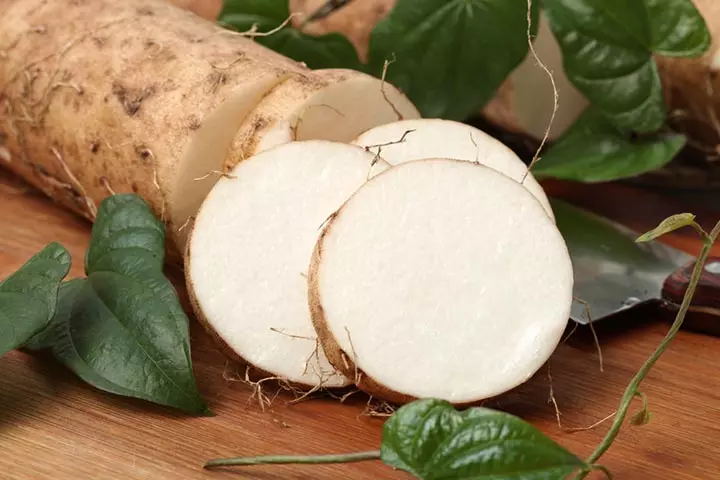
Yam contains antioxidants like beta-carotene and vitamin C. They help you fight common illness, prevent oxidative stressiAn imbalance of the production of free radicals and the levels of counteractive antioxidants in the body. and protect you from cancer (4).
5. Aids digestion
Raging hormones, growing uterus, etc. can all take a toll on your digestive system. Yam contains healthy starches, which are easy to digest (5). Furthermore, yam is a high-fiber food that can help treat constipation during pregnancy (6). In addition, this starchy vegetable can keep you satiated for longer, which can be particularly beneficial for healthy weight gain.
6. Prevents anemia
AnemiaiDeficiency of healthy red blood cells that carry oxygen to the body’s tissues. is a common problem during pregnancy. Yam contains minerals like zinc, copper, and iron, all of which play an important role in preventing and treating anemia (7).
7. Storehouse of folate
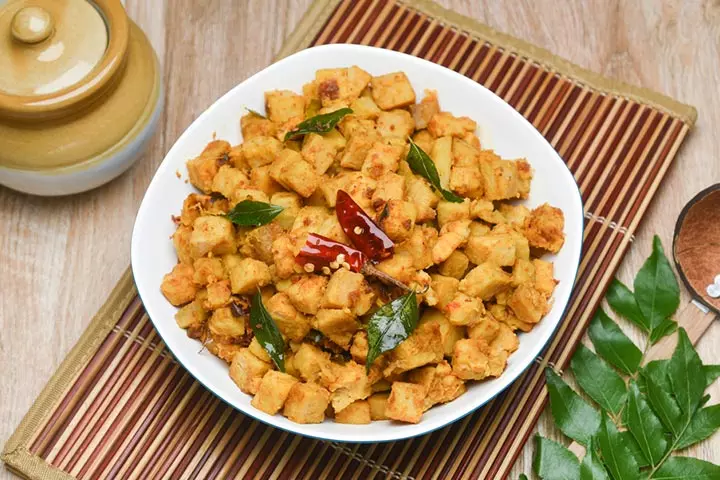
It is common knowledge that you need folate or folic acid in pregnancy. But why do you need it? Folic acid can protect your baby from neural neural tubeiA tube made up of the brain and spinal cord. defects (8). Yam contains a large amount of folate and is a must during pregnancy.
8. Good source of vitamin A
Yam provides around 166IU of vitamin A per cup of serving. You need this vitamin to ensure that your baby’s immune system stays healthy and strong (9). So, just by including yams in your prenatal diet you are supporting your baby’s health.
9. Prevents premature birth
Iron deficiency is a leading cause of premature birth. Adding yam to your diet can help prevent premature birth, as well as low birth weight of your baby (10).
10. Strengthens bones

You need to have strong bones especially during pregnancy. Your growing baby too needs calcium to build their bones (11). For that, you need a healthy dose of calcium. So, it makes sense to add yam to your prenatal diet as it contains 19mg of calcium, per serving.
 Quick fact
Quick fact11. Helps prevent miscarriage
During pregnancy, the risk of miscarriage increases. This can lead to a loss of blood flow to the uterus. Yams contain high levels of folic acid, which helps reduce the risk of miscarriage. Folate is a B vitamin that is necessary for healthy fetal brain development.
12. Boosts energy
Yams are rich in carbohydrates, which provide energy to the body. When you are pregnant, your body needs extra energy to help keep you going through the day. Carbohydrates give you energy but are not stored the same way as fat. Instead, they are converted into glucose and then transported to the liver where they are processed into glycogeniExcess glucose stored in the liver and muscle cells for later use. and released into the bloodstream.
 Quick fact
Quick factYou never thought that the not-so-pretty yam could provide such immense benefits, did you? Well, now that you know how yam benefits your health, let’s look at some of its side effects.
Side Effects Of Yam
Fortunately, yam is not an allergen. But you still need to exercise caution. Here are some things you should keep in mind:
1. Kidney stones
If you suffer from kidney stones, talk to your doctor before consuming yam. The tuber vegetable contains small amounts of oxalateiA compound produced by the body and present in various foods. and can cause kidney stones (12).
2. Digestive issues

If you have a sensitive digestive system, refrain from consuming yam. It can lead to issues like nausea, vomiting, headache, and diarrhea.
3. Wild yam
We still don’t know much about the impact of wild yam on pregnancy outcomes. So avoid consuming wild yam during pregnancy.
Hannah Whittaker, a pediatric and pregnancy dietitian from Liverpool, England, says, “I would not recommend bitter yam during pregnancy. There is evidence that it may contain toxins if not soaked and cooked correctly. So, there is insufficient evidence to support its safety during pregnancy.”
How To Buy And Store Yams
Here are some simple tips to buy good yams and properly store them at home to maintain their overall quality.
When Buying:
- Buy yams from organic farms if possible.
- Choose the ones that feel heavy and firm with smooth outer skin.
- Pick medium-sized yams with dry and unwrinkled skin.
- Avoid yams with soft spots, blemishes, or signs of mold.
When Storing:
- Wash the yams under cold running water to eliminate all the dirt and debris.
- Use a small amount of vinegar or lime juice mixed with water to loosen up the stubborn dirt patches.
- Wash the yams well with water. Do not use soap or detergents.
- Use a sharp knife to remove any soft spot, blemish, or discoloration. If you notice any rotting spots, discard the yam to prevent contamination while in storage.
- Dry the yams properly using a paper towel for some time before storing them.
- Store them in a cool, dark area like the basement of your house. Avoid storing them in very warm or frigid temperatures.
Frequently Asked Questions
1. Does yam lead to an increase in blood sugar when you’re pregnant?
Yams contain 15 grams of carbohydrates per serving, and carbohydrates do increase blood sugar levels (13) (14) (15). You should eat them in moderation during pregnancy. Also, seek your doctor’s advice before consuming them if you have gestational diabetes.
2. How can I eat yams during my pregnancy?
There are several ways you can include yams in your healthy eating regimen. Beauty Christian, a blogger, shares how she incorporated yams into her pregnancy diet. She says, “If I had to eat yam. I make yam porridge with enough fish. So for every food, you see more protein and less carbs (i).” Following her lead, you may add yams to your regular curries, prepare a side dish of mashed potatoes, or simply stir-fry yams along with your favorite vegetables. Ensure you wash and cook them well.
3. Can yam cause allergies in pregnant women and their babies?
Although yam allergies are uncommon, some people may be sensitive to raw yam, and smelling or eating it raw may cause an allergic reaction (16).
Yams are a rich source of beta carotene and fiber and can also provide several other nutrients that can play a role in proper fetal development. However, if you have a history of digestive issues or are experiencing them currently, it is advised to refrain from eating yam during pregnancy. In other cases, consult with your doctor before consuming yam or if you feel any discomfort after having them. You can add yams to various recipes and have them as a side dish to enjoy its benefits for both you and your developing baby.
Infographic: Why You Should Eat Yam When Pregnant
Yam is a starchy vegetable packed with nutrients necessary for maintaining a healthy pregnancy. In addition to being low in fat and high in antioxidants, dietary fiber, and potassium, yam also has several significant benefits when consumed during pregnancy. Check this infographic to learn about them.
Some thing wrong with infographic shortcode. please verify shortcode syntax
Illustration: Amazing Health Benefits Of Eating Yam During Pregnancy
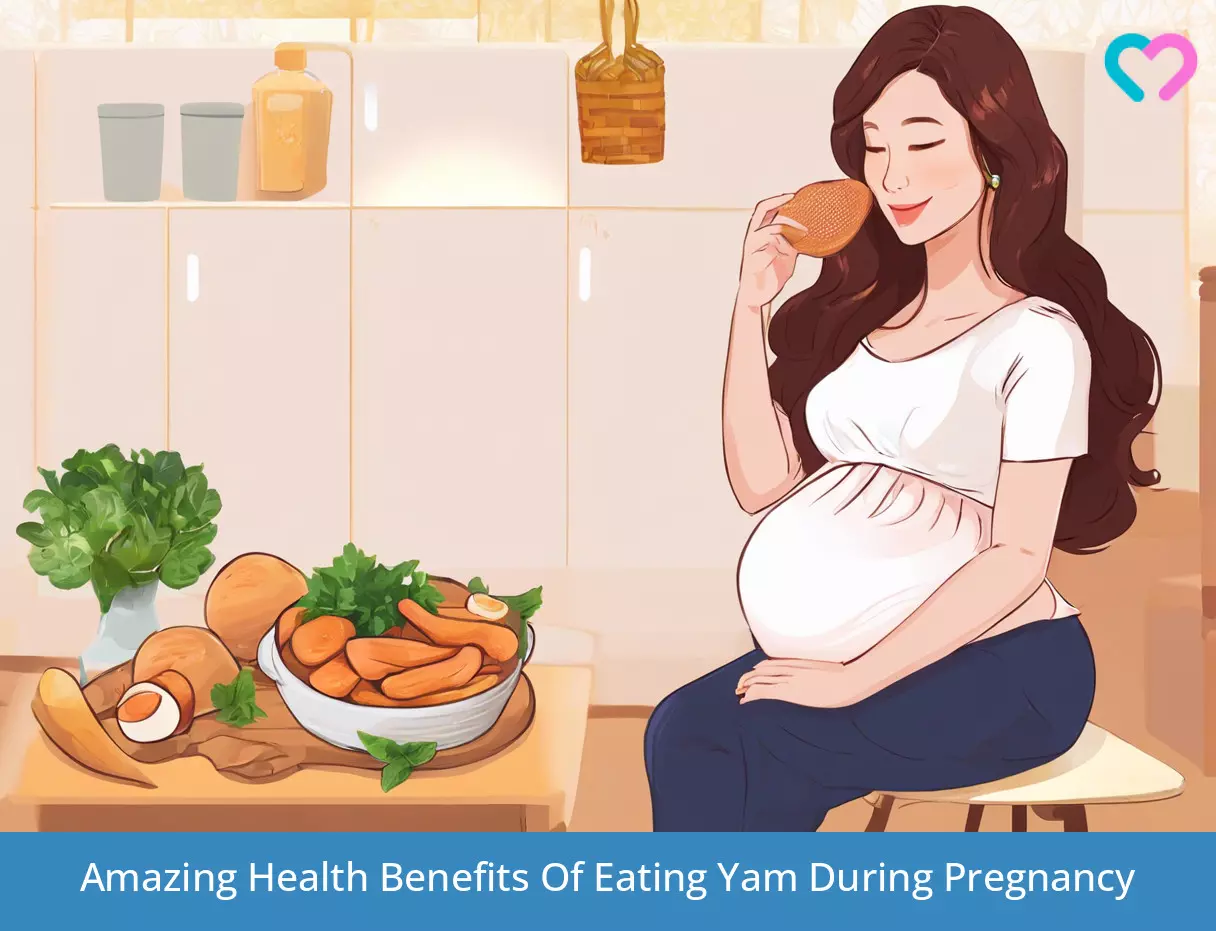
Image: Stable Diffusion/MomJunction Design Team
Personal Experience: Source
MomJunction articles include first-hand experiences to provide you with better insights through real-life narratives. Here are the sources of personal accounts referenced in this article.
i. How I gained only 2 kg during pregnancy.https://stylebybuiti.blogspot.com/2016/01/how-i-gained-only-2-kg-during-pregnancy.html
References
- Yam, raw.
https://fdc.nal.usda.gov/fdc-app.html#/food-details/170071/nutrients - Natural Sources of Vitamin B During Pregnancy.
https://www.mayoclinic.org/drugs-supplements/vitamin-b6/evidence/hrb-20058788 - Staying Healthy.
https://www.health.harvard.edu/category/staying-healthy - Antioxidants and Cancer Prevention.
https://www.cancer.gov/about-cancer/causes-prevention/risk/diet/antioxidants-fact-sheet - HEALTH BENEFITS OF YAM.
https://www.narayanahealth.org/blog/health-benefits-of-yam - Fiber.
https://www.hsph.harvard.edu/nutritionsource/carbohydrates/fiber/ - Amal A Hegazy et al.; (2010); Relation between anemia and blood levels of lead copper, zinc and iron among children.
https://pubmed.ncbi.nlm.nih.gov/20459857/ - Folic Acid: Sources and Recommended Intake.
https://www.cdc.gov/folic-acid/about/intake-and-sources.html - Zhiyi Huang et al.; (2018); Role of Vitamin A in the Immune System.
https://www.ncbi.nlm.nih.gov/pmc/articles/PMC6162863/ - T O Scholl et al.; (1992); Anemia vs iron deficiency: increased risk of preterm delivery in a prospective study.
https://pubmed.ncbi.nlm.nih.gov/1570808/ - L D Ritchie et al.; (1998); A longitudinal study of calcium homeostasis during human pregnancy and lactation and after resumption of menses.
https://pubmed.ncbi.nlm.nih.gov/9537616/ - Dietary Changes To Prevent Calcium Oxalate Stones.
https://mydoctor.kaiserpermanente.org/ncal/Images/Dietary%20Changes%20to%20Prevent%20Calcium%20Oxalate%20Stones_tcm75-194243.pdf - Get smart on carbs.
https://diabetes.org/healthy-living/recipes-nutrition/understanding-carbs#:~:text=When%20you%20eat%20or%20drink,of%20glucose%20in%20your%20blood. - Yam
https://mydoctor.kaiserpermanente.org/ncal/Images/Dietary%20Changes%20to%20Prevent%20Calcium%20Oxalate%20Stones_tcm75-194243.pdf - Healthy Eating for Gestational Diabetes
https://mydoctor.kaiserpermanente.org/ncal/article/healthy-eating-for-gestational-diabetes-721271 - Identification of a thermal stable allergen in yam (Dioscorea opposita) to cause anaphylaxis
https://www.ncbi.nlm.nih.gov/pmc/articles/PMC5796964/#:~:text=Allergic%20reaction%20to%20yam%20is
Community Experiences
Join the conversation and become a part of our nurturing community! Share your stories, experiences, and insights to connect with fellow parents.
Read full bio of Reda Elmardi

The benefits of yam during pregnancy are numerous for you and your baby. It is a rich source of vitamins, folic acid, and potassium and can help prevent various pregnancy-related health problems and aid in healthy fetal development.
Yam is a starchy vegetable that is similar to sweet potatoes in appearance but less sweet. They are rich in nutrients that can help alleviate morning sickness and pregnancy-related digestive problems. They also help babies achieve a healthy birth weight.
If you are considering including this root vegetable in your pregnancy diet, you can safely do so after consulting your healthcare provider. This is because yam may cause complications if you suffer from certain underlying conditions.
Continue reading to know more about the consumption of yam during pregnancy, including its beneficial properties and side effects.
[mj-toc]
Key Pointers
- Yam is rich in vitamins and minerals that can aid in curing morning sickness, preventing low birth weight, and regulating blood pressure during pregnancy.
- The antioxidants present in yam can improve digestion, prevent anemia, and strengthen bones. It also helps in reducing the risk of premature birth and miscarriage.
- Due to being a good source of carbohydrates, yam can help in boosting energy levels.
- Yam may also cause digestive issues and kidney stones, so it is important to consult a healthcare provider before consuming yam and limit its intake.
Nutritional Value Of Yam
Yam is a nutritious tubular vegetable containing several vital nutrients and bioactive compounds that can promote overall health. 100g of raw yam can provide the following nutrients that can help you meet your nutritional needs during pregnancy (1).
NUTRIENTS AMOUNT Energy 118Kcal Carbohydrate, by difference 27.9g Fiber, total dietary 4.1g Calcium, Ca 17mg Magnesium, Mg 21mg Phosphorus, P 55mg Potassium, K 816mg Folate, food 23µg Choline, total 16.5mg Carotene, beta 83µg Source: US Food And Drug Administration
Benefits Of Eating Yam During Pregnancy
If you like eating yam, there is no reason to stop now. Here are some reasons why including nutritious foods like yam in the pregnancy diet can be beneficial for maternal health:
1. Treats morning sickness

Image: Shutterstock Morning sickness is one of the most common symptoms women experience during pregnancy. Adequate amount of vitamin B6 can provide relief from nausea and vomiting (2). Yams contain a good amount of vitamin B6 and may calm morning sickness (1).
2. Prevents low birth weight
Yam contains vitamin B6, which helps prevent low birth weight in babies. In the United States, around 8.52% of babies were born with low birth weight in 2025, according to a CDC National Center for Health Statistics (NCHS) report. Including yam in a pregnancy diet can help decrease the risk of giving birth to low-birth-weight infants.
3. Regulates blood pressure (BP)
Yam is a storehouse of potassium. You need this mineral to help in keeping your blood pressure levels under control (3). High BP during pregnancy can cause serious complications.
4. Rich in antioxidants

Image: Shutterstock Yam contains antioxidants like beta-carotene and vitamin C. They help you fight common illness, prevent [simple_tooltip text="oxidative stress" tooltip="An imbalance of the production of free radicals and the levels of counteractive antioxidants in the body." ] and protect you from cancer (4).
5. Aids digestion
Raging hormones, growing uterus, etc. can all take a toll on your digestive system. Yam contains healthy starches, which are easy to digest (5). Furthermore, yam is a high-fiber food that can help treat constipation during pregnancy (6). In addition, this starchy vegetable can keep you satiated for longer, which can be particularly beneficial for healthy weight gain.
6. Prevents anemia
[simple_tooltip text="Anemia" tooltip="Deficiency of healthy red blood cells that carry oxygen to the body’s tissues. " ] is a common problem during pregnancy. Yam contains minerals like zinc, copper, and iron, all of which play an important role in preventing and treating anemia (7).
7. Storehouse of folate

Image: Shutterstock It is common knowledge that you need folate or folic acid in pregnancy. But why do you need it? Folic acid can protect your baby from neural [simple_tooltip text="neural tube" tooltip="A tube made up of the brain and spinal cord. " ] defects (8). Yam contains a large amount of folate and is a must during pregnancy.
8. Good source of vitamin A
Yam provides around 166IU of vitamin A per cup of serving. You need this vitamin to ensure that your baby’s immune system stays healthy and strong (9). So, just by including yams in your prenatal diet you are supporting your baby’s health.
9. Prevents premature birth
Iron deficiency is a leading cause of premature birth. Adding yam to your diet can help prevent premature birth, as well as low birth weight of your baby (10).
10. Strengthens bones

Image: Shutterstock You need to have strong bones especially during pregnancy. Your growing baby too needs calcium to build their bones (11). For that, you need a healthy dose of calcium. So, it makes sense to add yam to your prenatal diet as it contains 19mg of calcium, per serving.
[mj_protip type="Quick fact" title="Quick fact"]Yams also contain manganese, magnesium and potassium, which help in maintaining bone health (5).[/mj_protip]
11. Helps prevent miscarriage
During pregnancy, the risk of miscarriage increases. This can lead to a loss of blood flow to the uterus. Yams contain high levels of folic acid, which helps reduce the risk of miscarriage. Folate is a B vitamin that is necessary for healthy fetal brain development.
12. Boosts energy
Yams are rich in carbohydrates, which provide energy to the body. When you are pregnant, your body needs extra energy to help keep you going through the day. Carbohydrates give you energy but are not stored the same way as fat. Instead, they are converted into glucose and then transported to the liver where they are processed into [simple_tooltip text="glycogen" tooltip="Excess glucose stored in the liver and muscle cells for later use." ] and released into the bloodstream.
[mj_protip type="Quick fact" title="Quick fact"]Yams, especially those of the purple variety, help reduce fasting blood sugar and HbA1c levels (5).[/mj_protip]
You never thought that the not-so-pretty yam could provide such immense benefits, did you? Well, now that you know how yam benefits your health, let’s look at some of its side effects.
Side Effects Of Yam
Fortunately, yam is not an allergen. But you still need to exercise caution. Here are some things you should keep in mind:
1. Kidney stones
If you suffer from kidney stones, talk to your doctor before consuming yam. The tuber vegetable contains small amounts of [simple_tooltip text="oxalate" tooltip="A compound produced by the body and present in various foods." ] and can cause kidney stones (12).
2. Digestive issues

Image: Shutterstock If you have a sensitive digestive system, refrain from consuming yam. It can lead to issues like nausea, vomiting, headache, and diarrhea.
3. Wild yam
We still don't know much about the impact of wild yam on pregnancy outcomes. So avoid consuming wild yam during pregnancy.
Hannah Whittaker, a pediatric and pregnancy dietitian from Liverpool, England, says, “I would not recommend bitter yam during pregnancy. There is evidence that it may contain toxins if not soaked and cooked correctly. So, there is insufficient evidence to support its safety during pregnancy.”
How To Buy And Store Yams
Here are some simple tips to buy good yams and properly store them at home to maintain their overall quality.
When Buying:
- Buy yams from organic farms if possible.
- Choose the ones that feel heavy and firm with smooth outer skin.
- Pick medium-sized yams with dry and unwrinkled skin.
- Avoid yams with soft spots, blemishes, or signs of mold.
When Storing:
- Wash the yams under cold running water to eliminate all the dirt and debris.
- Use a small amount of vinegar or lime juice mixed with water to loosen up the stubborn dirt patches.
- Wash the yams well with water. Do not use soap or detergents.
- Use a sharp knife to remove any soft spot, blemish, or discoloration. If you notice any rotting spots, discard the yam to prevent contamination while in storage.
- Dry the yams properly using a paper towel for some time before storing them.
- Store them in a cool, dark area like the basement of your house. Avoid storing them in very warm or frigid temperatures.
Frequently Asked Questions
1. Does yam lead to an increase in blood sugar when you’re pregnant?
Yams contain 15 grams of carbohydrates per serving, and carbohydrates do increase blood sugar levels (13) (14) (15). You should eat them in moderation during pregnancy. Also, seek your doctor's advice before consuming them if you have gestational diabetes.
2. How can I eat yams during my pregnancy?
There are several ways you can include yams in your healthy eating regimen. Beauty Christian, a blogger, shares how she incorporated yams into her pregnancy diet. She says, "If I had to eat yam. I make yam porridge with enough fish. So for every food, you see more protein and less carbs (i)." Following her lead, you may add yams to your regular curries, prepare a side dish of mashed potatoes, or simply stir-fry yams along with your favorite vegetables. Ensure you wash and cook them well.
3. Can yam cause allergies in pregnant women and their babies?
Although yam allergies are uncommon, some people may be sensitive to raw yam, and smelling or eating it raw may cause an allergic reaction (16).
Yams are a rich source of beta carotene and fiber and can also provide several other nutrients that can play a role in proper fetal development. However, if you have a history of digestive issues or are experiencing them currently, it is advised to refrain from eating yam during pregnancy. In other cases, consult with your doctor before consuming yam or if you feel any discomfort after having them. You can add yams to various recipes and have them as a side dish to enjoy its benefits for both you and your developing baby.
Infographic: Why You Should Eat Yam When Pregnant
Yam is a starchy vegetable packed with nutrients necessary for maintaining a healthy pregnancy. In addition to being low in fat and high in antioxidants, dietary fiber, and potassium, yam also has several significant benefits when consumed during pregnancy. Check this infographic to learn about them.
[mj_Infographic title="Infographic: Why You Should Eat Yam When Pregnant" image_url="https://www.momjunction.com/wp-content/uploads/2025/01/Amazing-Health-Benefits-Of-Yam-During-Pregnancy.jpg" alt="amazing health benefits of yam during pregnancy (infographic)"][Illustration_image image_url="https://www.momjunction.com/wp-content/uploads/static-content/illustration_images/amazing_health_benefits_of_eating_yam_during_pregnancy_illustration.jpg" alt_txt="Eating Yam During Pregnancy" image_title="Amazing Health Benefits Of Eating Yam During Pregnancy" image_credit="Stable Diffusion/MomJunction Design Team"]
[youtube id="49CGlL-i_40"]
Personal Experience: Source
i. How I gained only 2 kg during pregnancy.
https://stylebybuiti.blogspot.com/2016/01/how-i-gained-only-2-kg-during-pregnancy.htmlReferences
- Yam, raw.
https://fdc.nal.usda.gov/fdc-app.html#/food-details/170071/nutrients - Natural Sources of Vitamin B During Pregnancy.
https://www.mayoclinic.org/drugs-supplements/vitamin-b6/evidence/hrb-20058788 - Staying Healthy.
https://www.health.harvard.edu/category/staying-healthy - Antioxidants and Cancer Prevention.
https://www.cancer.gov/about-cancer/causes-prevention/risk/diet/antioxidants-fact-sheet - HEALTH BENEFITS OF YAM.
https://www.narayanahealth.org/blog/health-benefits-of-yam - Fiber.
https://www.hsph.harvard.edu/nutritionsource/carbohydrates/fiber/ - Amal A Hegazy et al.; (2010); Relation between anemia and blood levels of lead copper, zinc and iron among children.
https://pubmed.ncbi.nlm.nih.gov/20459857/ - Folic Acid: Sources and Recommended Intake.
https://www.cdc.gov/folic-acid/about/intake-and-sources.html - Zhiyi Huang et al.; (2018); Role of Vitamin A in the Immune System.
https://www.ncbi.nlm.nih.gov/pmc/articles/PMC6162863/ - T O Scholl et al.; (1992); Anemia vs iron deficiency: increased risk of preterm delivery in a prospective study.
https://pubmed.ncbi.nlm.nih.gov/1570808/ - L D Ritchie et al.; (1998); A longitudinal study of calcium homeostasis during human pregnancy and lactation and after resumption of menses.
https://pubmed.ncbi.nlm.nih.gov/9537616/ - Dietary Changes To Prevent Calcium Oxalate Stones.
https://mydoctor.kaiserpermanente.org/ncal/Images/Dietary%20Changes%20to%20Prevent%20Calcium%20Oxalate%20Stones_tcm75-194243.pdf - Get smart on carbs.
https://diabetes.org/healthy-living/recipes-nutrition/understanding-carbs#:~:text=When%20you%20eat%20or%20drink,of%20glucose%20in%20your%20blood. - Yam
https://mydoctor.kaiserpermanente.org/ncal/Images/Dietary%20Changes%20to%20Prevent%20Calcium%20Oxalate%20Stones_tcm75-194243.pdf - Healthy Eating for Gestational Diabetes
https://mydoctor.kaiserpermanente.org/ncal/article/healthy-eating-for-gestational-diabetes-721271 - Identification of a thermal stable allergen in yam (Dioscorea opposita) to cause anaphylaxis
https://www.ncbi.nlm.nih.gov/pmc/articles/PMC5796964/#:~:text=Allergic%20reaction%20to%20yam%20is
The benefits of yam during pregnancy are numerous for you and your baby. It is a rich source of vitamins, folic acid, and potassium and can help prevent various pregnancy-related health problems and aid in healthy fetal development.
Yam is a starchy vegetable that is similar to sweet potatoes in appearance but less sweet. They are rich in nutrients that can help alleviate morning sickness and pregnancy-related digestive problems. They also help babies achieve a healthy birth weight.
If you are considering including this root vegetable in your pregnancy diet, you can safely do so after consulting your healthcare provider. This is because yam may cause complications if you suffer from certain underlying conditions.
Continue reading to know more about the consumption of yam during pregnancy, including its beneficial properties and side effects.
[mj-toc]
Key Pointers
- Yam is rich in vitamins and minerals that can aid in curing morning sickness, preventing low birth weight, and regulating blood pressure during pregnancy.
- The antioxidants present in yam can improve digestion, prevent anemia, and strengthen bones. It also helps in reducing the risk of premature birth and miscarriage.
- Due to being a good source of carbohydrates, yam can help in boosting energy levels.
- Yam may also cause digestive issues and kidney stones, so it is important to consult a healthcare provider before consuming yam and limit its intake.
Nutritional Value Of Yam
Yam is a nutritious tubular vegetable containing several vital nutrients and bioactive compounds that can promote overall health. 100g of raw yam can provide the following nutrients that can help you meet your nutritional needs during pregnancy (1).
NUTRIENTS AMOUNT Energy 118Kcal Carbohydrate, by difference 27.9g Fiber, total dietary 4.1g Calcium, Ca 17mg Magnesium, Mg 21mg Phosphorus, P 55mg Potassium, K 816mg Folate, food 23µg Choline, total 16.5mg Carotene, beta 83µg Source: US Food And Drug Administration
Benefits Of Eating Yam During Pregnancy
If you like eating yam, there is no reason to stop now. Here are some reasons why including nutritious foods like yam in the pregnancy diet can be beneficial for maternal health:
1. Treats morning sickness

Image: Shutterstock Morning sickness is one of the most common symptoms women experience during pregnancy. Adequate amount of vitamin B6 can provide relief from nausea and vomiting (2). Yams contain a good amount of vitamin B6 and may calm morning sickness (1).
2. Prevents low birth weight
Yam contains vitamin B6, which helps prevent low birth weight in babies. In the United States, around 8.52% of babies were born with low birth weight in 2025, according to a CDC National Center for Health Statistics (NCHS) report. Including yam in a pregnancy diet can help decrease the risk of giving birth to low-birth-weight infants.
3. Regulates blood pressure (BP)
Yam is a storehouse of potassium. You need this mineral to help in keeping your blood pressure levels under control (3). High BP during pregnancy can cause serious complications.
4. Rich in antioxidants

Image: Shutterstock Yam contains antioxidants like beta-carotene and vitamin C. They help you fight common illness, prevent [simple_tooltip text="oxidative stress" tooltip="An imbalance of the production of free radicals and the levels of counteractive antioxidants in the body." ] and protect you from cancer (4).
5. Aids digestion
Raging hormones, growing uterus, etc. can all take a toll on your digestive system. Yam contains healthy starches, which are easy to digest (5). Furthermore, yam is a high-fiber food that can help treat constipation during pregnancy (6). In addition, this starchy vegetable can keep you satiated for longer, which can be particularly beneficial for healthy weight gain.
6. Prevents anemia
[simple_tooltip text="Anemia" tooltip="Deficiency of healthy red blood cells that carry oxygen to the body’s tissues. " ] is a common problem during pregnancy. Yam contains minerals like zinc, copper, and iron, all of which play an important role in preventing and treating anemia (7).
7. Storehouse of folate

Image: Shutterstock It is common knowledge that you need folate or folic acid in pregnancy. But why do you need it? Folic acid can protect your baby from neural [simple_tooltip text="neural tube" tooltip="A tube made up of the brain and spinal cord. " ] defects (8). Yam contains a large amount of folate and is a must during pregnancy.
8. Good source of vitamin A
Yam provides around 166IU of vitamin A per cup of serving. You need this vitamin to ensure that your baby’s immune system stays healthy and strong (9). So, just by including yams in your prenatal diet you are supporting your baby’s health.
9. Prevents premature birth
Iron deficiency is a leading cause of premature birth. Adding yam to your diet can help prevent premature birth, as well as low birth weight of your baby (10).
10. Strengthens bones

Image: Shutterstock You need to have strong bones especially during pregnancy. Your growing baby too needs calcium to build their bones (11). For that, you need a healthy dose of calcium. So, it makes sense to add yam to your prenatal diet as it contains 19mg of calcium, per serving.
[mj_protip type="Quick fact" title="Quick fact"]Yams also contain manganese, magnesium and potassium, which help in maintaining bone health (5).[/mj_protip]
11. Helps prevent miscarriage
During pregnancy, the risk of miscarriage increases. This can lead to a loss of blood flow to the uterus. Yams contain high levels of folic acid, which helps reduce the risk of miscarriage. Folate is a B vitamin that is necessary for healthy fetal brain development.
12. Boosts energy
Yams are rich in carbohydrates, which provide energy to the body. When you are pregnant, your body needs extra energy to help keep you going through the day. Carbohydrates give you energy but are not stored the same way as fat. Instead, they are converted into glucose and then transported to the liver where they are processed into [simple_tooltip text="glycogen" tooltip="Excess glucose stored in the liver and muscle cells for later use." ] and released into the bloodstream.
[mj_protip type="Quick fact" title="Quick fact"]Yams, especially those of the purple variety, help reduce fasting blood sugar and HbA1c levels (5).[/mj_protip]
You never thought that the not-so-pretty yam could provide such immense benefits, did you? Well, now that you know how yam benefits your health, let’s look at some of its side effects.
Side Effects Of Yam
Fortunately, yam is not an allergen. But you still need to exercise caution. Here are some things you should keep in mind:
1. Kidney stones
If you suffer from kidney stones, talk to your doctor before consuming yam. The tuber vegetable contains small amounts of [simple_tooltip text="oxalate" tooltip="A compound produced by the body and present in various foods." ] and can cause kidney stones (12).
2. Digestive issues

Image: Shutterstock If you have a sensitive digestive system, refrain from consuming yam. It can lead to issues like nausea, vomiting, headache, and diarrhea.
3. Wild yam
We still don't know much about the impact of wild yam on pregnancy outcomes. So avoid consuming wild yam during pregnancy.
Hannah Whittaker, a pediatric and pregnancy dietitian from Liverpool, England, says, “I would not recommend bitter yam during pregnancy. There is evidence that it may contain toxins if not soaked and cooked correctly. So, there is insufficient evidence to support its safety during pregnancy.”
How To Buy And Store Yams
Here are some simple tips to buy good yams and properly store them at home to maintain their overall quality.
When Buying:
- Buy yams from organic farms if possible.
- Choose the ones that feel heavy and firm with smooth outer skin.
- Pick medium-sized yams with dry and unwrinkled skin.
- Avoid yams with soft spots, blemishes, or signs of mold.
When Storing:
- Wash the yams under cold running water to eliminate all the dirt and debris.
- Use a small amount of vinegar or lime juice mixed with water to loosen up the stubborn dirt patches.
- Wash the yams well with water. Do not use soap or detergents.
- Use a sharp knife to remove any soft spot, blemish, or discoloration. If you notice any rotting spots, discard the yam to prevent contamination while in storage.
- Dry the yams properly using a paper towel for some time before storing them.
- Store them in a cool, dark area like the basement of your house. Avoid storing them in very warm or frigid temperatures.
Frequently Asked Questions
1. Does yam lead to an increase in blood sugar when you’re pregnant?
Yams contain 15 grams of carbohydrates per serving, and carbohydrates do increase blood sugar levels (13) (14) (15). You should eat them in moderation during pregnancy. Also, seek your doctor's advice before consuming them if you have gestational diabetes.
2. How can I eat yams during my pregnancy?
There are several ways you can include yams in your healthy eating regimen. Beauty Christian, a blogger, shares how she incorporated yams into her pregnancy diet. She says, "If I had to eat yam. I make yam porridge with enough fish. So for every food, you see more protein and less carbs (i)." Following her lead, you may add yams to your regular curries, prepare a side dish of mashed potatoes, or simply stir-fry yams along with your favorite vegetables. Ensure you wash and cook them well.
3. Can yam cause allergies in pregnant women and their babies?
Although yam allergies are uncommon, some people may be sensitive to raw yam, and smelling or eating it raw may cause an allergic reaction (16).
Yams are a rich source of beta carotene and fiber and can also provide several other nutrients that can play a role in proper fetal development. However, if you have a history of digestive issues or are experiencing them currently, it is advised to refrain from eating yam during pregnancy. In other cases, consult with your doctor before consuming yam or if you feel any discomfort after having them. You can add yams to various recipes and have them as a side dish to enjoy its benefits for both you and your developing baby.
Infographic: Why You Should Eat Yam When Pregnant
Yam is a starchy vegetable packed with nutrients necessary for maintaining a healthy pregnancy. In addition to being low in fat and high in antioxidants, dietary fiber, and potassium, yam also has several significant benefits when consumed during pregnancy. Check this infographic to learn about them.
[mj_Infographic title="Infographic: Why You Should Eat Yam When Pregnant" image_url="https://www.momjunction.com/wp-content/uploads/2025/01/Amazing-Health-Benefits-Of-Yam-During-Pregnancy.jpg" alt="amazing health benefits of yam during pregnancy (infographic)"][Illustration_image image_url="https://www.momjunction.com/wp-content/uploads/static-content/illustration_images/amazing_health_benefits_of_eating_yam_during_pregnancy_illustration.jpg" alt_txt="Eating Yam During Pregnancy" image_title="Amazing Health Benefits Of Eating Yam During Pregnancy" image_credit="Stable Diffusion/MomJunction Design Team"]
[youtube id="49CGlL-i_40"]
Personal Experience: Source
i. How I gained only 2 kg during pregnancy.
https://stylebybuiti.blogspot.com/2016/01/how-i-gained-only-2-kg-during-pregnancy.htmlReferences
- Yam, raw.
https://fdc.nal.usda.gov/fdc-app.html#/food-details/170071/nutrients - Natural Sources of Vitamin B During Pregnancy.
https://www.mayoclinic.org/drugs-supplements/vitamin-b6/evidence/hrb-20058788 - Staying Healthy.
https://www.health.harvard.edu/category/staying-healthy - Antioxidants and Cancer Prevention.
https://www.cancer.gov/about-cancer/causes-prevention/risk/diet/antioxidants-fact-sheet - HEALTH BENEFITS OF YAM.
https://www.narayanahealth.org/blog/health-benefits-of-yam - Fiber.
https://www.hsph.harvard.edu/nutritionsource/carbohydrates/fiber/ - Amal A Hegazy et al.; (2010); Relation between anemia and blood levels of lead copper, zinc and iron among children.
https://pubmed.ncbi.nlm.nih.gov/20459857/ - Folic Acid: Sources and Recommended Intake.
https://www.cdc.gov/folic-acid/about/intake-and-sources.html - Zhiyi Huang et al.; (2018); Role of Vitamin A in the Immune System.
https://www.ncbi.nlm.nih.gov/pmc/articles/PMC6162863/ - T O Scholl et al.; (1992); Anemia vs iron deficiency: increased risk of preterm delivery in a prospective study.
https://pubmed.ncbi.nlm.nih.gov/1570808/ - L D Ritchie et al.; (1998); A longitudinal study of calcium homeostasis during human pregnancy and lactation and after resumption of menses.
https://pubmed.ncbi.nlm.nih.gov/9537616/ - Dietary Changes To Prevent Calcium Oxalate Stones.
https://mydoctor.kaiserpermanente.org/ncal/Images/Dietary%20Changes%20to%20Prevent%20Calcium%20Oxalate%20Stones_tcm75-194243.pdf - Get smart on carbs.
https://diabetes.org/healthy-living/recipes-nutrition/understanding-carbs#:~:text=When%20you%20eat%20or%20drink,of%20glucose%20in%20your%20blood. - Yam
https://mydoctor.kaiserpermanente.org/ncal/Images/Dietary%20Changes%20to%20Prevent%20Calcium%20Oxalate%20Stones_tcm75-194243.pdf - Healthy Eating for Gestational Diabetes
https://mydoctor.kaiserpermanente.org/ncal/article/healthy-eating-for-gestational-diabetes-721271 - Identification of a thermal stable allergen in yam (Dioscorea opposita) to cause anaphylaxis
https://www.ncbi.nlm.nih.gov/pmc/articles/PMC5796964/#:~:text=Allergic%20reaction%20to%20yam%20is
Read full bio of Ria Saha
Read full bio of Swati Patwal
Read full bio of Dr. Joyani Das








